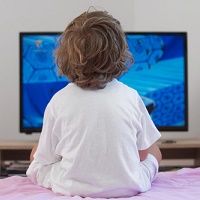New Study Measures Audiovisual Distraction During Pediatric Dental Procedures
Many dentists use videos or other audiovisual entertainment in hopes of calming pediatric patients during procedures. A new study aimed to figure out whether such techniques actually work.

A lot of people are scared of going to the dentist, but for one group of patients, this fear can negatively affect their oral health for years to come. Children are usually most scared of the dentist, and this fear is often reinforced by their own adult family members who are also wary of receiving dental care.
Pediatric dentists know that children’s dental phobias can often lead to disruptive behavior during visits, impacting the quality of care received. In fact, many dental practices use television in examination rooms as a way to distract patients from procedures that are taking place. In a new study, researchers sought to measure the effectiveness of audiovisual (AV) distraction during pediatric dental procedures to see whether such distraction influenced patient anxiety and fear.
In the study, 56 children, all between 7 and 9 years old, were separated into two groups. One group wore special eyeglasses displaying cartoons as an AV distraction. A control group received treatment with no distractions. Each patient received three dental treatments, and the amount of time for each treatment was 30 minutes or less.
To measure each child’s stress response during the visit, a combination of measures was utilized. First, children were asked to pick out a facial expression on a facial expression scale (FIS) that best matched the way they felt about being at the dentist. Next, providers were asked to rate the children’s cooperation during treatment on a scale of 0 to 5: 0 being most relaxed and 5 being completely out of control. Finally, all patients had multiple vital sign readings, specifically blood pressure and pulse rate, taken at intervals during the procedures. The readings were then averaged to generate a mean value for each visit.
When researchers analyzed the results of the study, they found that children in the group exposed to AV distraction were much less anxious and were more cooperative during procedures compared to children who had no distraction.
Vital sign results also demonstrated that children exposed to AV distraction had a reduction in clinical anxiety during injection with local anesthetics. There was significant elevation in pulse rate in the control group of children during anesthetic injections compared to the AV distraction group, who did not show pulse rate elevations both during and after any dental treatments. For both groups, there were no significant changes in blood pressure throughout any procedures.
While further research is necessary, this study indicates that AV distraction in children undergoing dental procedures seems to be an effective method of reducing anxiety and increasing cooperative behavior during treatment. There also seems to be evidence that AV distraction could be correlated with a more positive response after injection with local anesthetic. To reduce fear and anxiety during dental treatment, AV distraction seems to be a useful tool.